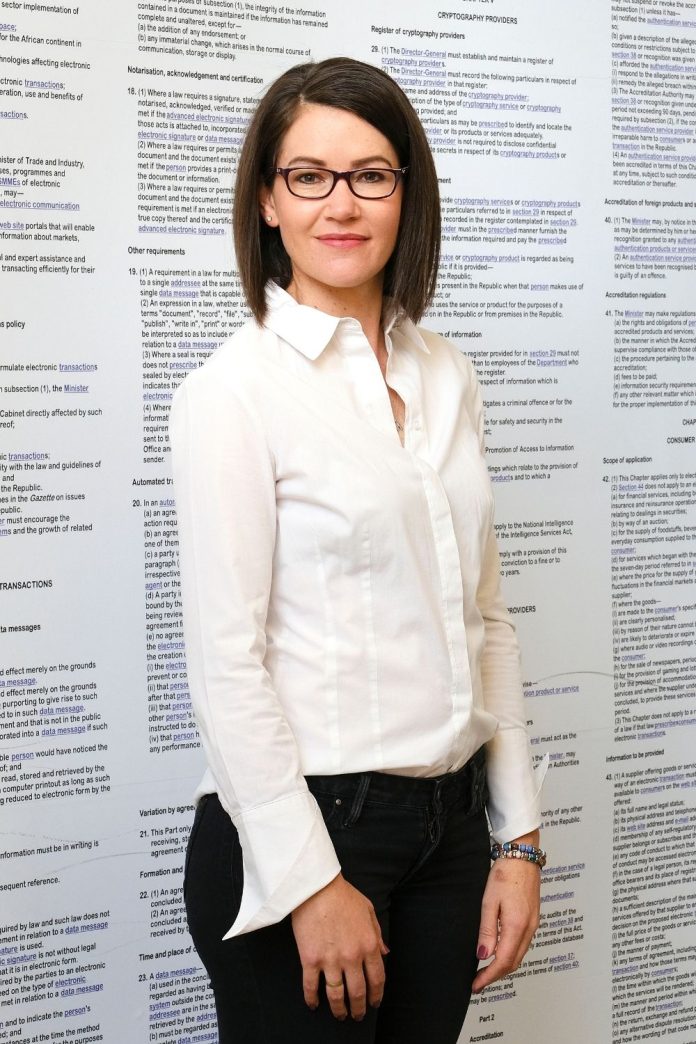By Andrea Tucker, Head of Research & Development and Strategic Projects at fintech specialist e4
In today’s digital world, where faxes have all but been replaced by email and landlines by smart phones, doesn’t it seem strange that we’re still signing contracts in person? That we’re driving hours to do so, creating mountains of paper trails, and storing them in lever arch files to gather dust, when the technology exists to eliminate this physical burden?
Blockchain has been proven to solve this problem, yet its business adoption has been slow. The technology at the heart of bitcoin and other virtual currencies, blockchain is an open, distributed ledger that can record transactions between two parties efficiently and in a verifiable and permanent way.
It’s time for the way we do administration to change.
Why so slow?
It’s no longer a question of whether the technology works – it does. But several other factors are hampering its widespread adoption.
Locally, blockchain is mostly being used in the cryptocurrency space, where there is significant energy and enthusiasm for it. But outside these circles, growth is slow.
One of the main challenges is the lack of regulation. This may seem counter-intuitive, since there is severe mistrust of government institutions and those in power due to abject corruption – not only in SA, but worldwide. Even in crypto circles, enthusiasts are torn between the benefits of regulation and the potential drawbacks.
But the technology itself addresses these concerns: transactions on the block are transparent and traceable, significantly reducing the opportunities for fraud and corruption – if scoped and implemented correctly. Regulation could furthermore address risks such as scams.
Lack of knowledge is the second challenge – not only in government, where regulation needs to happen, but also among the wider public. There is still a lack of awareness and understanding, as well as user experience and education – especially when it comes to security and privacy challenges.
Gathering speed
Most of the blockchain projects we see in SA are in the pilot phase to prove the business case that blockchain is secure, tamperproof, and transparent. The biggest adopters are in the crypto space, such as trading platforms, Bitcoin wallets, and Bitcoin exchange platforms.
One exciting non-crypto example is De Beers’ use of blockchain paired with other technologies to trace and authenticate the movement of natural diamonds. They created digital assets to represent the physical assets (diamonds) and multiple parties can now update and share data.
Such processes and transactions are a perfect example of how blockchain can change how we do business. The property market, for example, could benefit greatly. Buyers and sellers, multiple banks and attorneys, as well as the agent and the deeds office, could all access the transaction in one place. Verifications and legal requirements can be added to a master transaction viewable by all, drastically simplifying the process and reducing transaction times and paperwork, while creating an immutable, transparent transaction record.
While the benefits could be similar in the financial services industry in general, there would need to be more coordination and collaboration between banks to harness the power of this technology. The South African Reserve Bank is, however, assisting with the drive to rapidly mature the technology, allowing banks to position themselves in new and novel ways within their traditional ecosystems.
Building the business case for blockchain
As mind-bending as blockchain is, it’s not the most sensible solution for every business problem. It most benefits industries and businesses where there’s a true need for information sharing and collaboration between stakeholders, and where there is an industry body that requires standardisation and collective consensus.
Any organisation looking to invest in blockchain must ensure that they have a knowledgeable team of experts to call on. The technology itself is still immature, with no clear implementation success recipe, and as such certainly requires expertise.
Understanding the misconceptions and true benefits of blockchain is essential before embarking on a costly path to implement this technology when another could suffice. This team should also put thought into how the implementation can be quickly and easily scaled, and how it can integrate into legacy systems.
Blockchain is a complex technology, but when applied correctly, it can disrupt many aspects of business and government processes – for the immense benefit of our economy and society.








